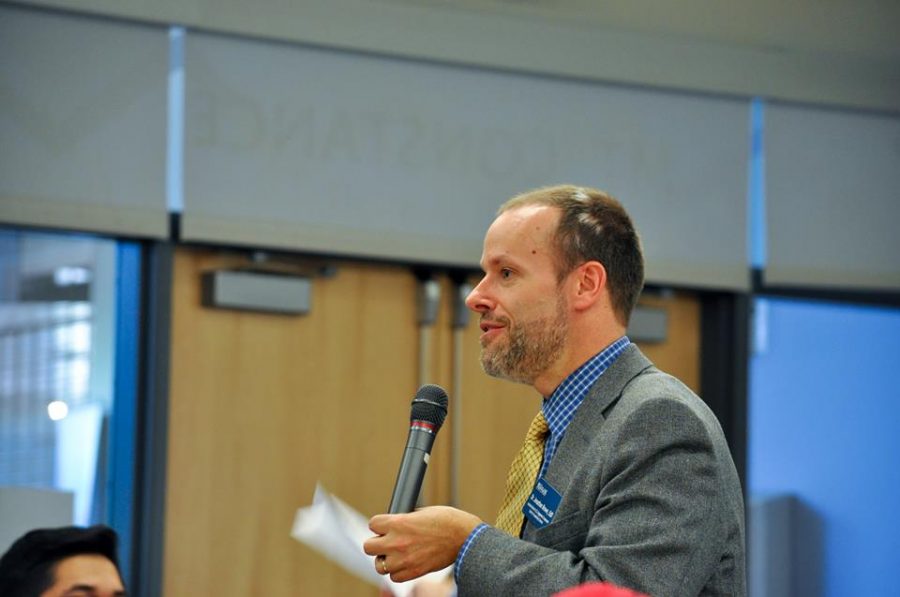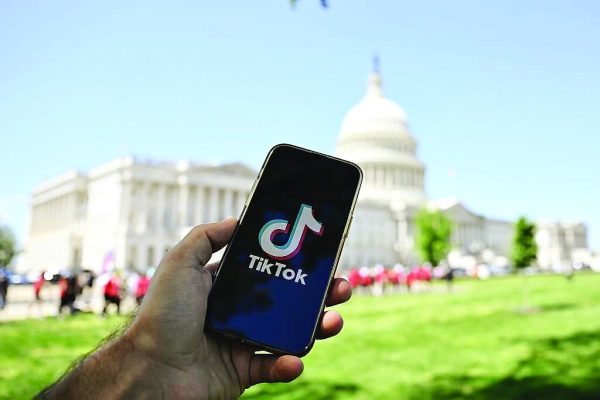Dr. JB’s 12 tips for student civic engagement
Dr. Jonathan Brown is the associate dean for Highline Community College’s Center for Leadership and Service. He thoughtfully engaged the crowd of student leaders as he emceed the 2016 Legislative Academy in Olympia.
To kick off the 2016 Legislative Academy in Olympia, Dr. Jonathan Brown drew on over 20 years of experience to deliver a fast-paced primer for student leaders getting involved in the legislative process.
Dr. Brown, or JB as he likes to be called, is the associate dean for Highline Community College’s Center for Leadership and Service, and worked as a director and supervisor of student programs at Shoreline and Edmonds Community Colleges respectively. A crowd of student representatives from about 30 of Washington’s community and technical colleges listened as he enthusiastically shared the twelve things he wished he knew before getting involved in the legislative cycle.
#1 Know Thyself
What does it mean to be a student? How are you connected to the EdCC mission and statewide college framework? What topics are important to your student government, and how do you fit into those pictures?
Knowing the issues gives you relevancy when speaking with legislators and college representatives. Knowing what you want to accomplish gives you a reason and purpose when getting involved with the legislative process. “This is not just a social call,” said Dr. Brown. “This is relationship building with purpose.”
#2 Some Legislative Basics
Washington state has a part-time legislature, which is only in session from January to April. Most legislators have jobs or own businesses and leave those positions to run the state on a part-time basis during the legislative session.
The State of Washington has a biennial budget, set every two years. Since most legislative policies are connected to finance, budget sessions tend to be longer and more intense. “Really, it’s like the year we do everything, and then the off year,” joked Dr. Brown. 2017 will be a budget year.
#3 Know the Structure
The legislative branch sets the budget for community and technical colleges. Advocates who want to increase funding or support policies that benefit community and technical colleges should therefore direct their focus on the state legislature. Committees in both the Wash. Senate and House of Representatives winnow down the bills that will be passed into law during a legislative session.
leg.wa.gov is a resource that can give you information about your legislators, your legislative district, legislator voting records and tools to track the progress of bills passing through Congress. “This is a very public process,” said Dr. Brown, “but it’s only public when people know about it.”
#4 Build Relationships NOW
“The legislative process is largely relational,” said Dr. Brown. Build relationships with the EdCC Board of Trustees and your legislators. Talk to student government about the priorities they plan to share with legislators, and let them know what is important to you.
The time to reach out to them is now, before the budget session begins in January. By joining the communication network at EdCC, you are leveraging your power as a student to be a part of the legislative process.
“Students are sleeping giants,” said Dr. Brown. “If you have two thousand students registered to vote on your campus, you have the ear of a legislator.” A few thousand student votes may not seem like much in a presidential race, but in a state legislative district they can decide an election.
#5 Power of Collective Action
A majority of the legislative districts in Wash. contain a community or technical college. This means a majority of state legislators have community or technical college students in their constituency. When students across the state speak with one voice and raise common concerns, they are more likely to be heard and affect change on the state level.
“When all legislators are contacted by students about the same thing, it creates buzz,” said Dr. Brown.
Students have incredible influence because their network is so broad. They are not just from Snohomish or King County, they are spread all across the state. This is why collective action with students at other community and technical colleges makes such a difference when trying to pass legislation favorable to students.
#6 How WACTCSA Helps
The Washington Community and Technical College Student Association (WACTCSA, pronounced ‘wax ah,’) is a bridge for student leaders. They coordinate and focus the voices of students at community and technical colleges around the state, creating momentum and collective action to influence the legislative process.
The WACTCSA annual agenda is a collection of common platforms selected by student representatives. “It’s not meant to limit you, it’s meant to enhance what you’re doing on campus and in your own legislative district,” said Dr. Brown.
#7 WACTCSA Gatherings
WACTCSA hosts five annual gatherings throughout the year. The Legislative Academy occurred on November 18 and 19, and consisted of education and introduction to the legislative process and WACTCSA agenda. The next event will be Legislative Advocacy Day in January, when student government representatives will visit legislators’ offices in Olympia to speak with them on student issues.
This May WACTCSA will hold the Voice Academy, where they will develop the legislative agenda for next year. In July WACTCSA will hold the Executive Summer Institute, an intense training and teambuilding opportunity for students directly involved in WACTCSA leadership. There will be a Leadership and Activities Institute next September, where WACTCSA delegates select their student officers and representatives.
#8 The Players
There are many boards and associations involved with college administration and the legislative process. Most of these groups are made up of state employees, and cannot lobby on behalf of students or colleges. The only two groups that can lobby legislators are students and the Association for College Trustees.
“If you are not working with your Trustees on your campus for your legislative work, you may be missing out,” said Dr. Brown. Building relationships with the EdCC Board of Trustees and sharing with them why certain issues are important to you as a student improves the chances of those issues being addressed by the legislative process.
#9 What’s New?
2017 will be a budget session, and the Wash. Congress promised to finally address the McCleary decision and fully fund K-12 education. With an education budget deficit in the hundreds of millions of dollars, and no major tax increases on the docket, where will the legislature find funding?
“From the things that they’re currently funding,” said Dr. Brown. “They’ve only got a couple choices. They can stop building some roads or fixing some roads, they could release some people from prison or they could cut higher ed funding.”
If community and technical college students do not vehemently communicate their needs to legislators this year, higher education funding may be cut in order to pay for K-12.
#10 The Long Term Game
Don’t come into the process assuming you can create new policy between now and the end of the 2017 legislative session. It usually takes three to seven years to enact legislation. Many of the items on the WACTCSA agenda have been around for multiple legislative cycles, proposed and supported by students who have already graduated or moved on.
“You are not doing this for yourself,” advised Dr. Brown. “You are doing this for your future and posterity.”
#11 Relationships Carry Issues
Legislators agree it is much easier to kill a bill in Congress than to support it. “What carries issues forward are relationships,” said Dr. Brown. When voters build a relationship with their legislator, it personalizes their issues. This gives lawmakers a reason to care about those issues, and support them during the legislative session.
Students are uniquely qualified to speak about the college experience; they are the ones living it. Student stories give legislators relevancy and legitimacy when crafting, defending or defeating certain bills in Olympia.
If you’re not speaking with your legislator about crucial issues, how can you expect them to adequately represent your interests? “Inaction creates no action in Olympia,” clued Dr. Brown.
#12 Small Wins Lead to Victory!
Don’t get discouraged because you may never directly benefit from the legislation you support. Getting more students registered to vote, participating in student government and building relationships with legislators and the Board of Trustees are small wins – and should all be celebrated.
Dr. Brown summed it up: “A series of small tiny little victories add up to big victories.” By diligently building relationships and knowing which issues are relevant to the EdCC community, you can help pass student-centered policy.






